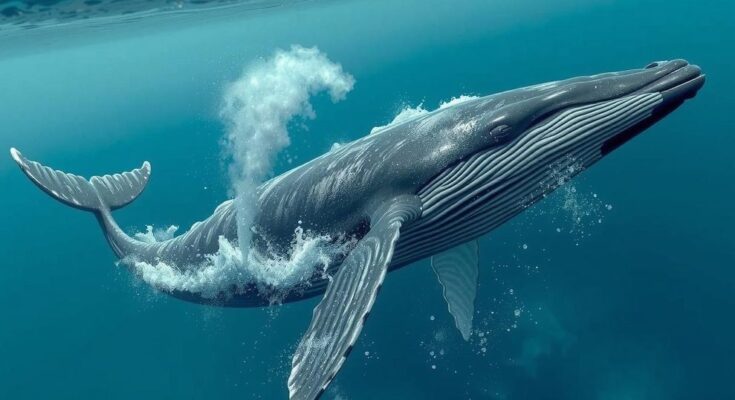A male humpback whale completed a record migration of over 13,000 km from Colombia to Tanzania, likely influenced by climate change. Initially seen in Colombia in 2013 and 2017, the whale was later identified in Zanzibar in 2022. This remarkable journey raises questions about environmental changes affecting food supply and breeding behaviors among humpback whales.
A male humpback whale has achieved a remarkable migration spanning over 13,000 kilometers from Colombia to Tanzania, highlighting the potential effects of climate change. Initially identified in the summer breeding grounds off the Colombian coast in 2013 and 2017, the whale was spotted in 2022 near Zanzibar, marking a significant journey that raises questions about environmental changes affecting marine life. This extraordinary movement is thought to either result from diminishing food sources or a search for mates in new breeding areas due to global conservation efforts, emphasizing the adaptability of these majestic creatures. Scientists utilized a database and artificial intelligence to trace the whale’s path, correlating its distinctive fluke patterns with prior sightings, and affirming it as a remarkable event in marine biology.
Humpback whales are known for their extensive migratory patterns, traveling annual distances to thrive in breeding and feeding grounds. This particular whale’s journey is unprecedented, occurring amidst concerns about climate change affecting oceanic ecosystems. The increased frequency and severity of environmental events may force whales to adapt their migration routes significantly. Furthermore, the role of global conservation efforts in enhancing humpback whale populations allows for exploration of new territories, making each sighting significant in understanding these species’ ecology.
The extraordinary migration of a humpback whale from Colombia to Tanzania underscores the impacts of environmental change on marine species. This record-breaking journey, spanning at least 13,000 kilometers, prompts deliberation regarding the factors driving such migrations—whether it be food scarcity or mate-seeking behavior. Through innovative use of technology, researchers continue to unveil the remarkable behaviors of humpback whales, further contributing to the understanding of their migration and survival amid changing ocean conditions.
Original Source: www.thecitizen.co.tz




